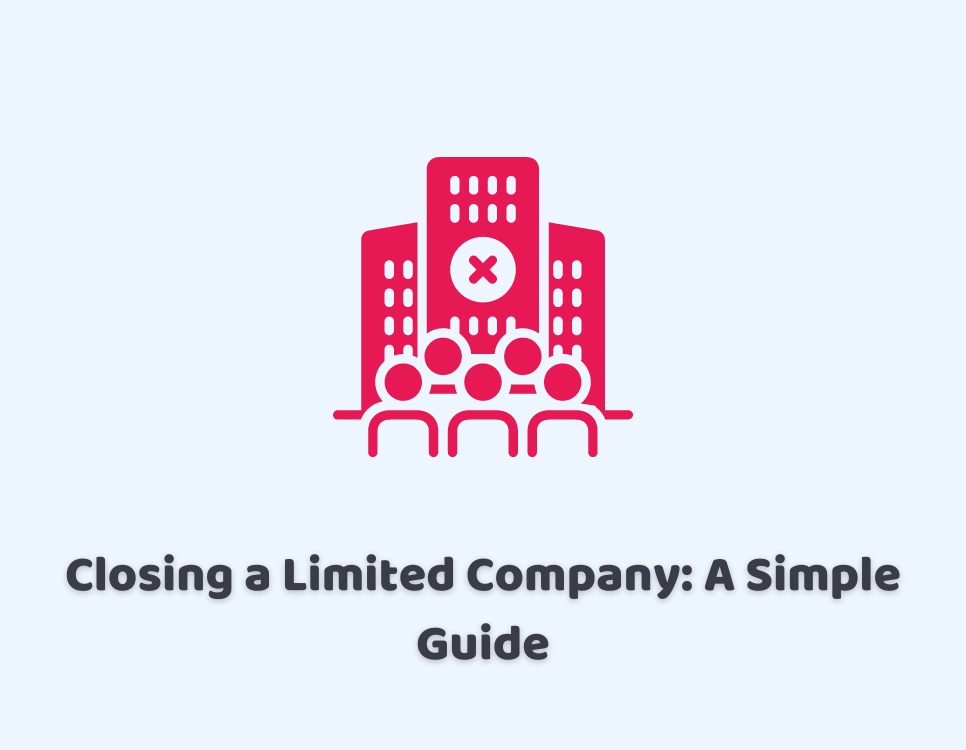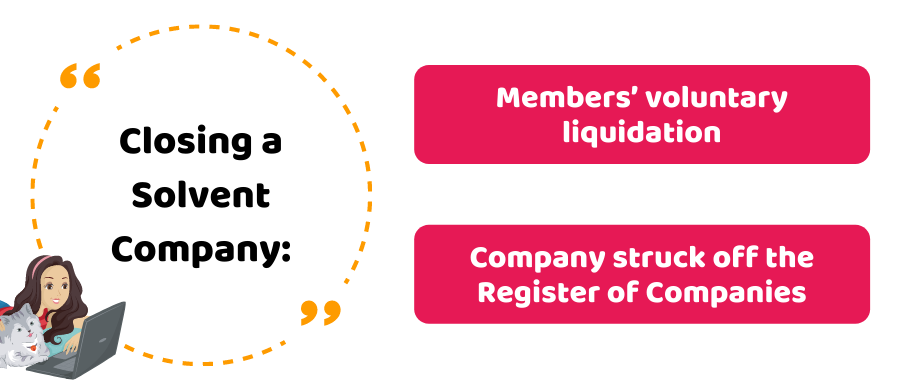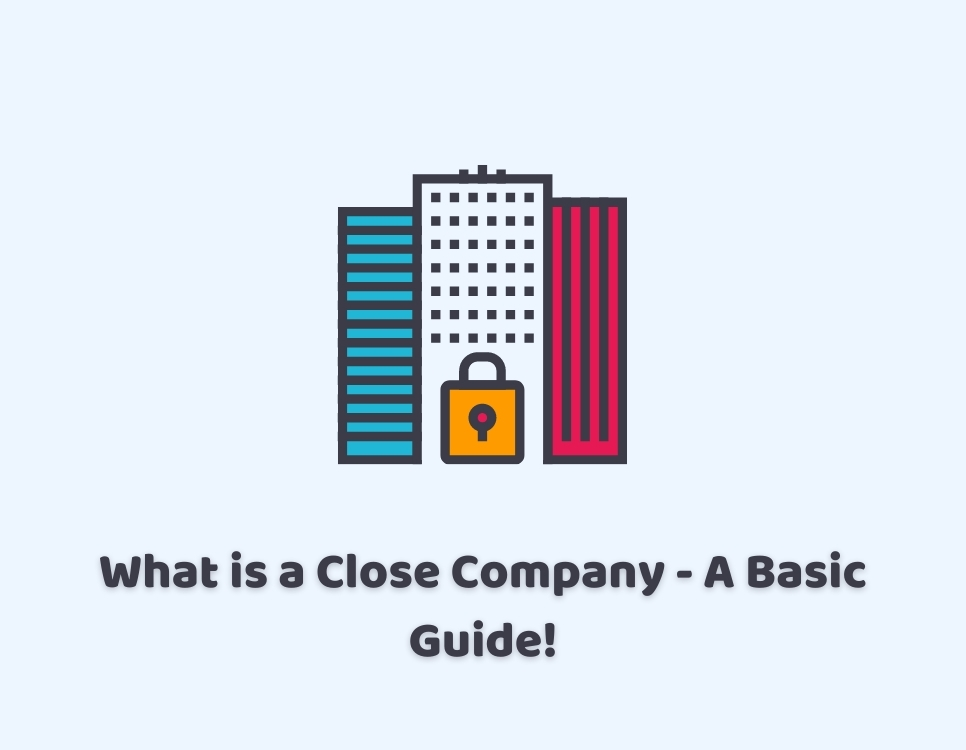
26/01/2022Business , Limited Company
Depending on your circumstances, closing a limited company can sometimes be an easy process but sometimes it can turn out to be a gruelling task that needs expert assistance. Whether you want to liquidate/dissolve a company, or you want it to strike off, you need to understand what is the best route to close a company. For this reason, we have come up with the different options that you can use to close a company. We’d break down the options available for the closing of a company based on whether a company is solvent or insolvent.
Before we delve deep into the topic, let’s kick off with what is solvent or what is insolvent?
CruseBurke offers inclusive accounting, taxation, payroll, company formation and liquidation services at the best price. Check out our company formation packages and our accounting services for small businesses. Contact us right now!
Solvent or Insolvent: What’s the Difference?
A solvent company can pay its bills and liabilities and has no threats of legal actions from creditors. Whereas, an insolvent company can’t pay its liabilities and debts. Insolvent company has insufficient funds and its liabilities are worth more than its total assets.
Closing a Limited Company (Solvent)
There are two ways to close a solvent company, you can either:

- Start a members’ voluntary liquidation
- Apply to get the company struck off the Register of Companies
Let’s talk about member Voluntarily Liquidation:
Members’ Voluntary Liquidation
For most directors, members’ voluntarily liquidation is a tax-efficient way to liquidate a company. Shareholders get the value of their shares instead of being charged with capital gains or income tax.
To strike off the company from the company register, you need to voluntarily liquidate your company if one of the following things applies:
- You want to retire
- You don’t wish to run the business
- You want to quit or retire from the family business and there’s no one to run it
To qualify for members’ voluntary liquidation, you must:
- Prepare a Declaration of solvency’ (English and Welsh companies)
- Ask the Accountant in Bankruptcy for form 4.25 (Scot) – Scottish companies
You’ll be required to review the assets and liabilities of the company before making the declaration.
Strike off the Limited Company From Companies Register
Striking off a company is the cheapest and easiest way to close a solvent company.
You can strike off a company through the company register, only if it needs to meet the following conditions:
- Its name remains the same for the last 3 months
- Isn’t threatened with liquidation
- Has no agreements with creditors
- Hasn’t been involved in trading activity or sold off any stock in the last 3 months
Get help from our insolvency practitioner. Check out our company formation packages and our accounting services for small businesses. Contact us right now!
Closing an Insolvent Limited Company
An insolvent company can arrange a liquidation if it is unable to pay its creditors. It can also go into compulsory liquidation. In simple words, if the liabilities of a company exceed its total assets it can be called insolvent. There are three ways to determine if a company is insolvent:
- The balance sheet test – Are the company’s assets more than its liabilities?
- The cash flow test- Is your company in a situation to pay its bills?
- The legal action test- Is there any legal action taken out against your company in access of £750?
Arrange Liquidation with your Creditors
To liquidate an insolvent company, a director can inform that a company has stopped trading and be liquidated if:
- The company cannot pay its liabilities
- Enough shareholders agree
Get Shareholders’ Agreement
You must call a meeting of shareholders and ask them to vote. Remember that 75% (by the value of shares) of shareholders must agree to the winding-up to pass a ‘winding-up resolution. You need to follow these three steps after the resolution:
- An authorised insolvency practitioner must be appointed as a liquidator to manage the insolvency process.
- The resolution needs to be published in Gazette within 14 days.
- Send the resolution to Companies House within 15 days
How Much Time does it take to Dissolve a Company?
Generally, three months are taken to dissolve a company after it has been published in the Gazette. However, it may vary considerably depending upon the complexity of the process.
Responsibilities When Closing a Company
Closing a limited company is not a straightforward process, there are a lot of responsibilities to meet along with the following:
VAT Deregistration
When closing a company, you need to deregister your company from VAT by completing a VAT form 7 (if it is VAT registered) and informing HMRC about it.
Corporation Tax
You need to inform HMRC that you are closing the company, otherwise, you may receive reminders to pay corporation tax by HMRC.
Capital Gains Tax
When closing the company, you may sell or transfer the company’s assets to yourself at the market value. So you need to pay the capital gains tax liability levied on you at the time of closing your company on your self-assessment tax return.
How CruseBurke Can Help?
If you have decided to end the company, closing a limited company can be the best route to take with our company liquidation services. Getting the help of our limited company accountants can help you relieve the stress involved with setting up or closing a company.
Save your time, money, and stress by turning to CruseBurke for setting up or closing a company. We have a team of skilled Limited Company accountants to do everything for you from scratch, we will deal with HMRC and Companies House on your behalf. Contact us right away!
Get an instant quote for a customised offer at a fixed fee!
Disclaimer: This blog is written for general information on the topic.


